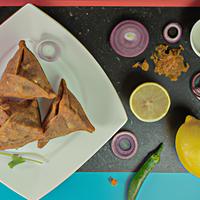
1 serving (100 grams) contains 262 calories, 5.5 grams of protein, 13.5 grams of fat, and 32.5 grams of carbohydrates.

Log this food in SnapCalorie

Nutrition Information
Calories |
623.8 | ||
|---|---|---|---|
% Daily Value* |
|||
| Total Fat | 32.1 g | 41% | |
| Saturated Fat | 6.0 g | 30% | |
| Polyunsaturated Fat | 0 g | ||
| Cholesterol | 0 mg | 0% | |
| Sodium | 1000 mg | 43% | |
| Total Carbohydrates | 77.4 g | 28% | |
| Dietary Fiber | 8.3 g | 29% | |
| Sugars | 3.6 g | ||
| protein | 13.1 g | 26% | |
| Vitamin D | 0 mcg | 0% | |
| Calcium | 71.4 mg | 5% | |
| Iron | 3.6 mg | 20% | |
| Potassium | 595.2 mg | 12% | |
* Percent Daily Values are based on a 2,000 calorie diet. Your daily values may be higher or lower depending on your calorie needs.
Food Attributes
Source of Calories
About Pakistan samosa
Pakistan Samosa is a popular savory pastry from Pakistani cuisine, known for its crispy, golden-brown exterior and flavorful fillings. Typically triangular in shape, samosas are made with a thin, flaky dough that is stuffed with a variety of fillings, often including spiced potatoes, green peas, onions, and sometimes minced meat like chicken or beef. The spices used, such as chili powder, cumin, and coriander, give the samosa its distinctively bold and aromatic flavor. While samosas are delicious and satisfying, they are traditionally deep-fried, which can make them high in calories and saturated fats. On the positive side, the vegetable-packed fillings provide fiber and some vitamins, and the use of spices can offer antioxidant benefits. For a healthier alternative, samosas can be baked instead of fried, reducing their fat content while still maintaining their signature taste. Perfect as a snack or appetizer, Pakistan Samosa is a cherished treat in South Asian cuisine.



